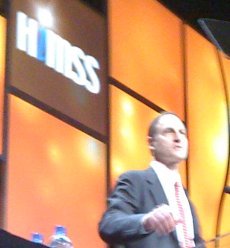Blumenthal starts to fight the FUD

With the meaningful use guidelines just about ready for release, National Coordinator for Health IT David Blumenthal is now directly addressing the Fear, Uncertainty and Doubt (FUD) surrounding the automation of American health records.
The campaign is being conducted in specialty media like Stanford Medicine, with Blumenthal (right, at this year's HIMSS show) confidently telling doctors patients are "going to get better care" with alerts on things like medicinal side effects delivered at the point of care.
But the FUD over Electronic Health Record (EHR) is going to general audiences, and Blumenthal needs to be heard there.
Typical is a new Case Western study claiming doctors could be held liable for software errors.
The actual paper, published in the Berkeley Technology Law Journal, however, isn't quite as alarming as the headline:
Historically, medical innovations, such as anesthetics and x-rays, have generated increased tort litigation as patients quickly came to expect better care while physicians struggled to perfect their use of challenging technologies. The same phenomenon may well occur with EHR systems.
In other words, a lot of this is inevitable. The alternative to the "risks" described by Sharona Hoffman and Andy Podgurski is to stop progress.
That's not the way laymen will read it, however.
Another great piece of FUD is coming from PriceWaterhouseCoopers, with a survey showing only half of the Chief Information Officers at American hospitals think they can meet the 2011 guidelines in fiscal 2011, which starts in October.
Some of the problems cited in the survey, like the shortage of trained staff, are in fact being addressed through education programs funded by the same HITECH law bringing hospitals that sweet, sweet stimulus cash.
Other concerns aren't so easily addressed, especially vendor confusion and ongoing consolidation in the space. The report shows CIOs asking the right questions, and becoming discouraged when they don't get instant answers.
Even among those most worried, however, there is a belief that EHRs will be of great help in overstressed emergency rooms, in other words that they will prevent more mistakes than they cause, and most are moving ahead. (One hint -- those who are furthest ahead are including patients in their planning.)
It's true. Electronic records mean more people taking on more liability. But no one in any position of authority, in either the public or private sector, is calling those concerns a show stopper.
